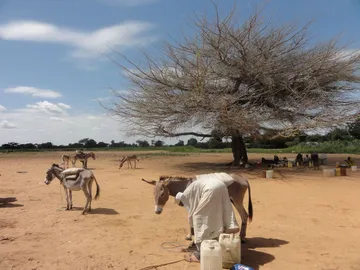Donors must double spending to end hunger by 2030, research finds
October 13, 2020.
- Five major research organisations call for additional US$14bn aid a year to end hunger.
- Groundbreaking economic costings published alongside collection of 8 Nature Research articles, using new AI tools to show best way to end hunger sustainably.
- Donors expected to pledge new funding at event on 13 October.
If donors doubletheir investments and spend the money wisely, they could help end hunger by 2030, a coalition of research groups said in a call-to-action ahead of World Food Day. Donors must spend an additional US$14bn a year on average a year between now and 2030, roughly double what they currently spend on aid for food security and nutrition, according to new research from the Centre for Development Research (ZEF), Cornell University, the UN Food and Agricultural Organization (FAO), the International Food Policy Research Institute (IFPRI), and the International Institute for Sustainable Development (IISD).
Maximo Torero, Chief Economist at FAO, said: “The world produces enough food to feed everyone. So it’s unacceptable that 690 million people are undernourished, 2 billion don’t have regular access to sufficient amounts of safe, nutritious food, and 3 billion people cannot afford healthy diets. If rich countries double their aid commitments and help poor countries to prioritize, properly target and scale up cost effective interventions on agricultural R&D, technology, innovation, education, social protection and on trade facilitation, we can end hunger by 2030.”
The call-to-action represents a coming together of two projects - Ceres2030: Sustainable Solutions to End Hunger, led by Cornell, IFPRI and IISD, and joint research from FAO and ZEF. Both sets of findings will be presented at an event on 13 October hosted by the German government, where donors are expected to pledge money to the Global Agriculture and Food Security Programme (GAFSP).
Ceres2030 and FAO-ZEF used different methodologies, but arrived at the same conclusion that donors should double their spending. Ceres2030 built a computable general equilibrium (CGE) economic model to assess the best way to end hunger sustainably, in line with the second UN Sustainable Development Goal. David Laborde, Senior Research Fellow at IFPRI, said: “We found that if donors double their aid, alongside poorer countries also increasing spending from their own budgets, then by the end of the decade we could end hunger, double the incomes of 545 million small-scale farmers, and limit agricultural emissions in line with the Paris climate agreement.”
Joachim von Braun, ZEF Director and Chair of the Scientific Group that advises the UN on the upcoming Food Systems Summit, said: “Our study shows that an additional $39-50 billion per annum is needed to end hunger by 2030, as envisaged by the second Sustainable Development Goal. To make good on the promise that G7 countries made in Elmau in 2015 to lift 500 million people out of hunger, requires donors to spend an additional $11 to 14 billion per annum, which is about double their current aid spending on food security. This investment must contribute to long-term development and sustainability.”
Ceres2030 also developed a groundbreaking new AI machine-learning tool, described in a paper in Nature Machine Intelligence, which was used by a young, female-led team of over 70 researchers from 23 countries to answer eight research questions covering areas such as water scarcity and employment for the future. The findings were published in a new collection of 8 peer-reviewed journal articles in Nature Research, which show how governments can best target their spending to end hunger, whilst also increasing the incomes of smallholder farmers and reducing the impact of agriculture on the environment.
Jaron Porciello, Associate Director at Cornell University, said: “We used our new AI tool to analyse half a million articles from the last 20 years. The tool helped us identify the 10,000 most relevant articles, from which we could then draw valuable conclusions about what works to end hunger. This approach could be replicated to build a scientific evidence base for many of the world’s most complex policy problems. We urge governments to use our findings to ensure their aid spending is as effective as possible.”
The Ceres2030 and FAO-ZEF studies both recommend that donors make interventions that are evidence-based and designed to support each other, including investing in agricultural R&D, supporting social protection programs that provide food or cash to those in aid, and driving inclusion, such as through improving female literacy and providing training for rural youth. Spending should focus on where the need is greatest - primarily sub-Saharan Africa, and also south Asia.
Carin Smaller, Director of Agriculture, Trade and Investment at IISD, said: “This is a call to action. If rich countries double their aid commitments on food security and nutrition, the end of hunger will be within reach. With just 10 years to go to meet the UN Sustainable Development Goals, we need a concerted, coordinated effort - led by evidence and fuelled by adequate funding. Our five organisations have provided donors with the evidence they need to end hunger sustainably, now it’s time to act.
Research published by ZEF/FAO (2020):
Center for Development Research (ZEF), University of Bonn and United Nations Food and Agriculture Organization (FAO):
Investment Costs and Policy Action Opportunities for Reaching a World without Hunger (SDG 2), Bonn and Rome, Oct 2020.
Full report here: http://bit.ly/ZEF_FAO_SDG2
Policy Brief in English: http://bit.ly/SDG2_policybrief
Policy Brief in German: http://bit.ly/SDG2_policybrief_DE
Research published by ZEF and AKADEMIYA2063 (2020):
From Potentials to Reality - Transforming Africa’s Food Production, Bonn and Dakar. Oct. 2020.
Von den Potenzialen zur Realität: Wie die afrikanische Lebensmittelproduktion gesteigert werden kann
(German version): https://bit.ly/ZEF_A2063_d
Find more information on the ZEF/Akademiya2063 report here.
News coverage on this topic:
Eßlinger Zeitung, October 12: Welhungerhilfe: Corona "Brandbeschleuniger" für Hunger
Agrarheute, October 12: Entwicklungsminister Müller fordert Agrarrevolution gegen den Hunger
Top agrar online, October 13: Hungerkrise: Landwirtschaftsproduktion bis 2050 um 60% steigern
Rural21, October 13: A world without hunger is possible – what must be done



